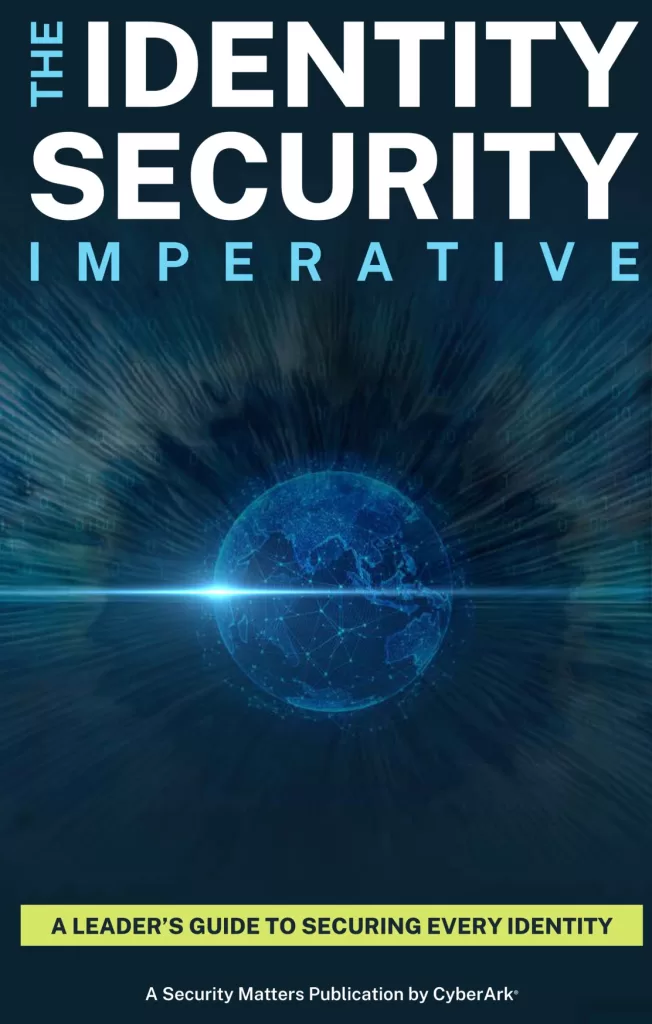In today’s digital landscape, identity security is paramount. The dramatic increase of both human and machine identities has changed the rules of cybersecurity. They are how attackers target credentials and access points as their primary method of intrusion.
CyberArk’s The Identity Security Imperative: A Leader’s Guide to Securing Every Identity presents a stark reality—identity-based attacks have become the most effective weapon in a hacker’s arsenal. The book outlines a strategic, proactive approach to securing identities and ensuring business resilience in an era of relentless cyber threats.
You can get a copy of CyberArk’s The Identity Security Imperative: A Leader’s Guide to Securing Every Identity here. Some of what we took away follows.

This Can No Longer Be an Afterthought
Cybersecurity is no longer about protecting networks; it is about protecting identities. The explosion of human and machine identities across cloud platforms, software-as-a-service (SaaS) applications, and hybrid IT environments has created an expanding attack surface.
The reach of these attacks is staggering; 93% of organizations have faced identity-related cyberattacks in the past year, highlighting the urgency of rethinking traditional security models. The book emphasizes that outdated, perimeter-based defenses are ineffective against today’s threats, which exploit credentials rather than breaking through firewalls.
CyberArk argues for a paradigm shift that places this at the core of cyber defense strategies. Organizations must move beyond identity and access management (IAM) alone and adopt intelligent solutions that provide:
- Zero Standing Privileges (ZSP): No user or system should have permanent privileged access.
- AI-Driven Threat Detection: Security teams must use AI to predict and neutralize threats in real-time.
- Integrated Security Strategies: Identity security cannot operate in isolation—it must be embedded across cloud, endpoint, and application security ecosystems.
A Practical Framework for Identity Security
CyberArk provides a plan for organizations looking to enhance their security posture. The principles outlined in the book include:
- Identity Security as a Core Cybersecurity Function
- Organizations must move beyond password management and multi-factor authentication (MFA). Identity security should be a foundational element of the overall cybersecurity strategy, ensuring continuous verification and risk-based access controls.
- Zero Trust as the New Standard
- A Zero Trust approach assumes that no user, device, or application should be automatically trusted. Every access request must be verified, and security teams must eliminate implicit trust in systems and networks.
- AI-Enabled Identity Protection
- Machine learning and automation enhance detection and response capabilities, helping organizations identify anomalous behaviors before they escalate into security incidents. AI should work for defenders, not just attackers.
- Aligning with Regulatory and Compliance Standards
- As a result of new and changing regulations, businesses must ensure that their identity security programs meet compliance requirements. But they must do this in a way that maintains operations efficiently.
- Continuous Improvement & Adaptive Security
- The cyber threat landscape is constantly evolving. Organizations must refine and adapt their identity security strategies to stay ahead of attackers.
The Business Case for Identity Security
Beyond security: protecting identities is critical to business resilience. Cyberattacks that compromise credentials don’t just expose data. They disrupt operations, erode customer trust, and cause financial losses.
CyberArk’s message is clear: Identity security is no longer optional but a business imperative. Organizations that fail to act now risk falling victim to the next major breach.
Takeaways for Security Leaders
- Identity security is the frontline of cybersecurity. Attackers are targeting credentials, not just networks.
- Zero Trust must be the default security model. No user, device, or application should have automatic access.
- AI is a necessary defense tool. Machine learning can help security teams stay ahead of evolving threats.
- Businesses must embed identity security into their overall cyber strategy. Fragmented approaches leave gaps for attackers to exploit.
- Cyber resilience starts with securing identities. Organizations that take proactive measures will reduce risk and build a foundation for long-term security success.
Other News: The Critical Role of Identity Security – Delinea’s 2024 Cyber Insurance Report(Opens in a new browser tab).
